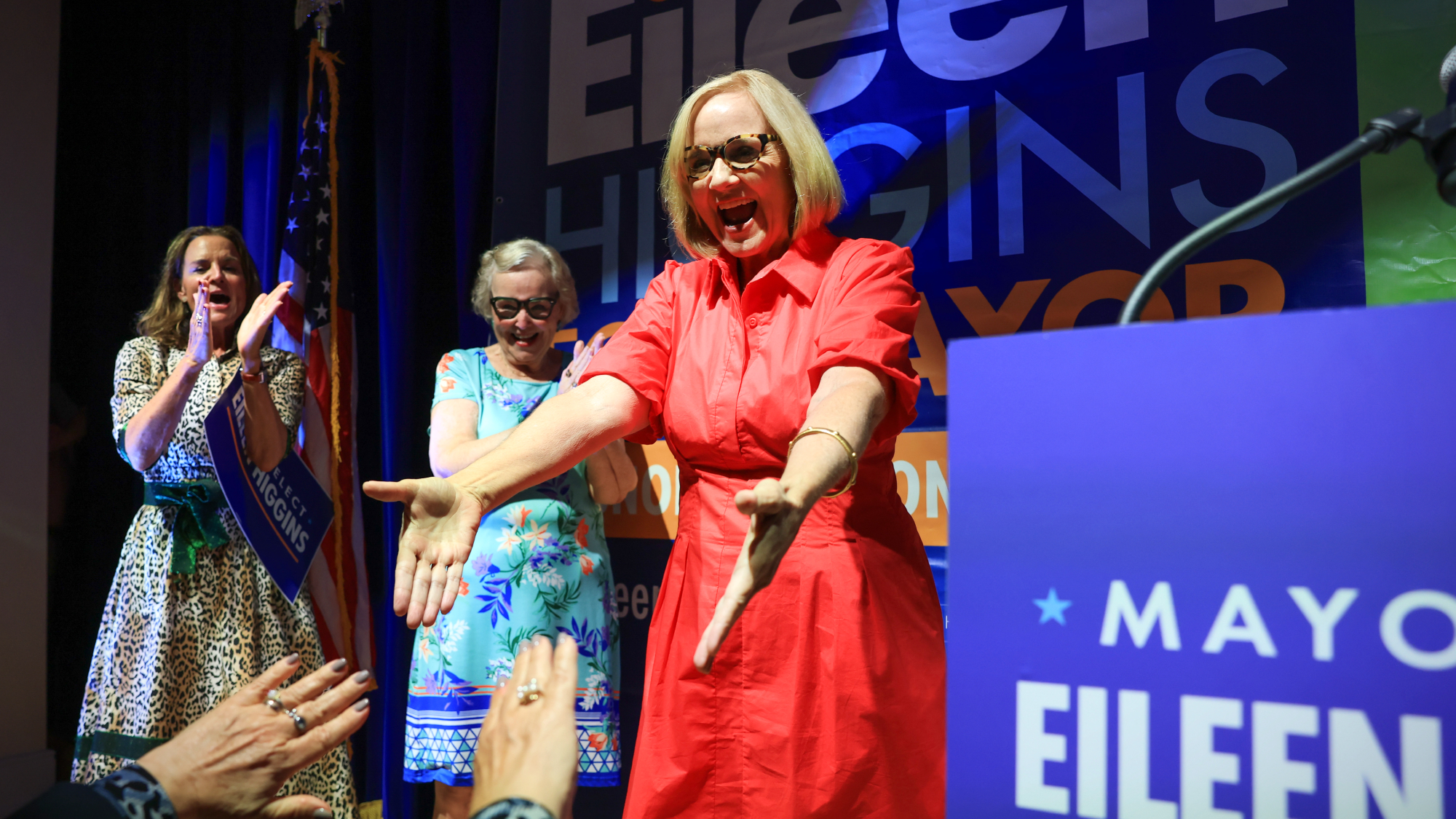Sen. Kyrsten Sinema leaves Democrats to become an independent. What does it mean?
The first-term Arizona senator says she's "declaring my independence" from the two-party system, but what's actually changed?


A free daily email with the biggest news stories of the day – and the best features from TheWeek.com
You are now subscribed
Your newsletter sign-up was successful
Democrats basking in the glow of their narrowly expanded Senate majority were treated to a rude awakening on Friday morning, with Arizona Sen. Krysten Sinema's surprise announcement that she was "declaring my independence from the broken partisan system in Washington," and officially registering as an independent in her home state.

Sinema's decision — trumpeted in a lengthy opinion piece for the Arizona Republic and bolstered by both a campaign-style video and coordinated interviews with Politico and CNN — is understandably being treated as a seismic shake-up for Democrats and the Senate at large; party defections are not only rare (there have been just 17 in-office Senate switches since 1900) but can serve as a significant reordering of what had previously been understood to be a settled congressional dynamic. In Sinema's case, however, the full effect of her announcement remains frustratingly unclear, as both the senator and her colleagues seem unwilling (or unable) to fully articulate just what the switch will mean for the party, the Senate, and the Arizonans who elected a Democrat on the assumption that she would remain so throughout her career.
How did we get here?
While sudden, Sinema's decision to abandon the Democratic party is not, in retrospect, wholly surprising. Sinema's time in politics — first in the state house, then the U.S. House of Representatives, and now the Senate — has been a slow, but steady progression rightward from her initial role as a spokesperson for the local Green Party who worked for Ralph Nader's quixotic presidential bid. By the time she'd begun running for Senate in 2018, however, she'd largely rejected the "extreme" label once applied to her by both Democrats and Republicans alike, instead positioning herself as running to be "a voice for all Arizonans, not just one political party."
The Week
Escape your echo chamber. Get the facts behind the news, plus analysis from multiple perspectives.

Sign up for The Week's Free Newsletters
From our morning news briefing to a weekly Good News Newsletter, get the best of The Week delivered directly to your inbox.
From our morning news briefing to a weekly Good News Newsletter, get the best of The Week delivered directly to your inbox.
While a tack to the center can be a shrewd campaign strategy, particularly in an ambivalently purple state like Arizona, Simena continued pushing rightward during her first few years in the Senate. She regularly frustrated Democrats by actively working to scuttle a number of her party's policy goals, earning praise from Republicans for many of those same efforts. And while she'd denied rumors of a pending party switch for years, speculation that she was headed if not into the arms of Republicans than at least out of those of the Democrats persisted.
So what's changed?
For now, it's not entirely clear. According to Senate Majority Leader Chuck Schumer (D-N.Y.) Sinema will retain her committee positions, and Democrats "will maintain our new majority on committees, exercise our subpoena power, and be able to clear nominees without discharge votes." The strong implication in Schumer's agreeing to let Sinema keep her committee posts is that she will continue to caucus with the Democrats, similar to current Senate independents Bernie Sanders (I-VT) and Angus King (I-Maine). Speaking with The Washington Post, Sen. Chris Murphy (D-Conn.) appeared to concur, saying "this seems like this changes the letter next to her name and not much else." The White House, too, has tried to downplay any potential chaos Sinema's announcement may prompt, with one official telling CNN that "we've worked with her effectively on a lot of major legislation from CHIPS to the bipartisan infrastructure law" and that the administration has "every reason to expect that will continue."
What will almost certainly change, however, is how both Democrats and Republicans plan to approach 2024, and Sinema's presumptive bid for re-election.
What comes next?
One prevailing theory that began circulating almost immediately after her announcement is that Sinema's decision to switch parties was animated in large part by her hopes to avoid a potential acrimonious primary challenge as she seeks re-election in 2024 — and to force the party to line up behind her to prevent her third party bid from serving as a spoiler for a Democratic nominee. Already the state party has come out hard against Sinema's defection, blasting her as beholden to "corporations and billionaires, not Arizonans" in a brief, fiery statement Friday morning.
A free daily email with the biggest news stories of the day – and the best features from TheWeek.com
Rep. Ruben Gallego (D-Ariz.), long rumored to be considering a leftward challenge for Sinema's Senate seat, offered a similarly vitriolic assessment of her switch, criticizing her for "once again putting her own interests ahead of getting things done for Arizonans" in a statement. It's harsh rhetoric from someone who once lauded Sinema as "the one who's passing legislation and is working across the aisle," but not wholly unexpected from a man whose campaign website proudly links to an article published in The Nation titled "Ruben Gallego's Fury Over Uvalde Is Exactly Why He Must Challenge Sinema."
While it's unclear how Sinema's party switch will play with Arizona voters themselves, any 2024 re-election effort will necessarily need to contend with the senator's deep unpopularity, which polling this past autumn showed cuts across every demographic and political affiliation:
In her essay explaining why she was leaving the Democratic Party, Sinema noted that Arizonans register as independents at a pace that frequently surpasses that of the major political parties. It's clear that in registering as one herself, Sinema feels she can capitalize on that same sense of autonomy and self-determination. What's less clear is if voters — the Democrats who supported her as one of their own, and Republicans who rejected her as one of the others — feel the same way.
Rafi Schwartz has worked as a politics writer at The Week since 2022, where he covers elections, Congress and the White House. He was previously a contributing writer with Mic focusing largely on politics, a senior writer with Splinter News, a staff writer for Fusion's news lab, and the managing editor of Heeb Magazine, a Jewish life and culture publication. Rafi's work has appeared in Rolling Stone, GOOD and The Forward, among others.
-
 The world’s most romantic hotels
The world’s most romantic hotelsThe Week Recommends Treetop hideaways, secluded villas and a woodland cabin – perfect settings for Valentine’s Day
-
 Democrats push for ICE accountability
Democrats push for ICE accountabilityFeature U.S. citizens shot and violently detained by immigration agents testify at Capitol Hill hearing
-
 The price of sporting glory
The price of sporting gloryFeature The Milan-Cortina Winter Olympics kicked off this week. Will Italy regret playing host?
-
 Democrats push for ICE accountability
Democrats push for ICE accountabilityFeature U.S. citizens shot and violently detained by immigration agents testify at Capitol Hill hearing
-
 Democrats win House race, flip Texas Senate seat
Democrats win House race, flip Texas Senate seatSpeed Read Christian Menefee won the special election for an open House seat in the Houston area
-
 Is Alex Pretti shooting a turning point for Trump?
Is Alex Pretti shooting a turning point for Trump?Today’s Big Question Death of nurse at the hands of Ice officers could be ‘crucial’ moment for America
-
 ‘Dark woke’: what it means and how it might help Democrats
‘Dark woke’: what it means and how it might help DemocratsThe Explainer Some Democrats are embracing crasser rhetoric, respectability be damned
-
 How realistic is the Democratic plan to retake the Senate this year?
How realistic is the Democratic plan to retake the Senate this year?TODAY’S BIG QUESTION Schumer is growing bullish on his party’s odds in November — is it typical partisan optimism, or something more?
-
 Kelly sues Hegseth, Pentagon over censure
Kelly sues Hegseth, Pentagon over censureSpeed Read Hegseth’s censure was ‘unlawful and unconstitutional,’ Kelly said
-
 Democrat files to impeach RFK Jr.
Democrat files to impeach RFK Jr.Speed Read Rep. Haley Stevens filed articles of impeachment against Health and Human Services Secretary Robert F. Kennedy Jr.
-
 Miami elects first Democratic mayor in 28 years
Miami elects first Democratic mayor in 28 yearsSpeed Read Eileen Higgins, Miami’s first woman mayor, focused on affordability and Trump’s immigration crackdown in her campaign
